|
|
|
Sort Order |
|
|
|
Items / Page
|
|
|
|
|
|
|
| Srl | Item |
| 1 |
ID:
157493
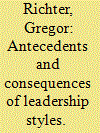

|
|
|
|
|
| Summary/Abstract |
There are numerous studies on the success of various leadership styles that refer to the link between styles and levels of performance and other relevant organizational parameters. Data from a recent survey in a multinational headquarters (HQs) replicate previous findings on leadership style concerning the preferences of the subordinates for more participation in decision-making. Although multinational HQs are in many ways unique organizations that could present unique leadership challenges, too, the findings using traditional models of leadership show how similarly, compared to civilian companies and public administrations, leadership styles are perceived and evaluated by subordinates. Apart from that, the survey data indicate that leadership style—quite different from what was expected—has no significant effect on “organizational commitment” and “mission clarity.” The reasons for that result are discussed against the backdrop of the peculiarities of the organization under investigation.
|
|
|
|
|
|
|
|
|
|
|
|
|
|
|
|
| 2 |
ID:
189922
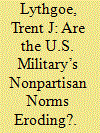

|
|
|
|
|
| Summary/Abstract |
The U.S. military’s nonpartisan norms are an important part of healthy civil–military relations. Some research, however, suggest these norms are weakening. This study examines the evidence for eroding nonpartisan norms by analyzing U.S. military servicemembers’ partisan affiliations and political activism levels from 2008 to 2018. It finds that since 2008, military servicemembers have become more likely to identify as partisans. Servicemembers have also become more politically active than civilians, although this is due to decreasing activism among the American public. It also finds that longer-serving service members have stronger nonpartisan norms, but that newer servicemembers are more politically active than both longer-serving servicemembers and civilians. These findings provide a firmer empirical foundation for previous claims of eroding norms and suggest more research is needed to understand how increased partisanship and political activism impacts military readiness and civil–military relations.
|
|
|
|
|
|
|
|
|
|
|
|
|
|
|
|
| 3 |
ID:
193056
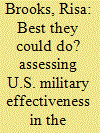

|
|
|
|
|
| Summary/Abstract |
This article explores shortcomings in military effectiveness in the war in Afghanistan. It focuses on three sets of problems: the failure to resolve internal contradictions in the training effort, the failure to integrate political considerations with military activity, and poor strategic and operational/tactical integration.
|
|
|
|
|
|
|
|
|
|
|
|
|
|
|
|
| 4 |
ID:
197362


|
|
|
|
|
| Summary/Abstract |
Northern Nigeria has been plagued by the nefarious activities of terrorist groups, including Boko Haram, its affiliates, and armed bandits. Beyond its kinetic operations, the military has since deployed several strategies toward trust building across the region. This article contributes to the literature, by adopting process-based leadership as a social psychology conceptual and analytical lens. As a departure from traditional conceptualizations of civil–military relations, process-based leadership identifies where influence exists and how it is being exchanged toward the attainment of mutually linked security goals and objectives, between the military and society, in conflict settings. A central argument of the article is that improving civil–military relations in conflict settings is largely dependent on trust building, and achieving this is a function of the exchange of influence and the establishment of mutuality between the military and society.
|
|
|
|
|
|
|
|
|
|
|
|
|
|
|
|
| 5 |
ID:
186090
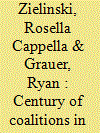

|
|
|
|
|
| Summary/Abstract |
Under what conditions do battlefield coalitions fight as greater or less than the sum of their parts? Introducing the Belligerents in Battle dataset, which contains information on actors fighting in 492 battles during interstate wars waged between 1900 and 2003, we present, for the first time, a portrait of the universe of battlefield coalitions. Battlefield coalitions win more often and suffer fewer casualties than belligerents fighting alone. Battlefield coalitions including forces fielded by the United States, states with pre-existing treaty agreements, and democracies are particularly powerful. By contrast, battlefield coalitions that include non-state actors lose the majority of their fights.
|
|
|
|
|
|
|
|
|
|
|
|
|
|
|
|
| 6 |
ID:
121814
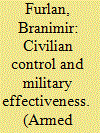

|
|
|
|
|
| Publication |
2013.
|
| Summary/Abstract |
This article gives an overview of how civilian control of the military in Slovenia is implemented in practice. It utilizes the perspective of the controlled entity itself, that is, the Slovenian Armed Forces. The findings show the type and characteristics of civilian control in Slovenia and how they hinder military effectiveness. As one of the European transition countries to have concluded the democratization of its civil-military relations, civilian control over Slovenia's Armed Forces is now in place; however, the control mechanisms have had several debilitating effects on the country's armed forces-the democratization of civil-military relations has been achieved at the partial expense of military effectiveness. Because of this experience, the Slovenian case could serve as an example of how successful democratization of civil-military relations can sometimes produce negative outcomes, or collateral damage, for the military, especially when the employers of the control mechanisms are not aware of the effects that the exercise of their control might have on the military's ability to execute core missions. Methodologically, this article brings an approach for analyzing interrelations between civilian control and military effectiveness.
|
|
|
|
|
|
|
|
|
|
|
|
|
|
|
|
| 7 |
ID:
194783


|
|
|
|
|
| Summary/Abstract |
This article analyzes the relationship between civil–military relations and professional military education (PME) in Türkiye before the 2016 coup attempt. Its main argument is that an effective PME system could not be realized due to the problematic nature of civil–military relations. The dominant role of the military in politics turned PME into a domain reserved solely for soldiers; however, this autonomy did not help the officer corps to create an effective PME system. Based on historical analyses, this article concludes that civil–military cooperation is necessary for developing a successful PME system, and it endorses Mukherjee’s integrated model. Moreover, it shows that civil–military cooperation for the development of PME is a requirement regardless of the nature of civil–military relations.
|
|
|
|
|
|
|
|
|
|
|
|
|
|
|
|
| 8 |
ID:
189920
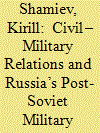

|
|
|
|
|
| Summary/Abstract |
This article studies the role of military culture in defense policymaking. It focuses on Russia’s post-Soviet civil–military relations and military reform attempts. After the fall of the Soviet Union, Russia’s armed forces were in a state of despair. Despite having relative institutional autonomy, the military neither made itself more effective before minister Serdyukov nor tried to overthrow the government. The paper uses the advocacy coalition framework’s belief system approach to analyze data from military memoirs, parliamentary speeches, and 15 interviews. The research shows that the military’s support for institutional autonomy, combined with its elites’ self-serving bias, critically contributed to what I term an “imperfect equilibrium” in Russian civil–military relations: the military could not reform itself and fought back against radical, though necessary, changes imposed by civilian leadership.
|
|
|
|
|
|
|
|
|
|
|
|
|
|
|
|
| 9 |
ID:
186091
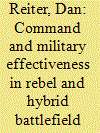

|
|
|
|
|
| Summary/Abstract |
Conventional thinking frames battlefield coalitions as collections of national armies fighting together as multinational coalitions. However, wars also include rebel groups fighting together as coalitions, and rebel groups fighting alongside states in hybrid coalitions. This paper seeks to better understand rebel and hybrid battlefield coalitions, focusing on command and operational military effectiveness. The paper first presents basic ideas about coalition command and military effectiveness from conventional wisdom on multinational coalitions. It then builds on these ideas to explore potential similarities and differences between multinational coalitions on one hand and rebel and hybrid coalitions on the other. In particular, the paper focuses on the nature of different command structures, the varying operational military effectiveness advantages for unified coalition command, and the political motivations for coalition members to resist creating unified command, despite potential effectiveness benefits. The paper concludes by providing policy recommendations to states who lead hybrid coalitions.
|
|
|
|
|
|
|
|
|
|
|
|
|
|
|
|
| 10 |
ID:
163093
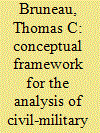

|
|
|
|
|
| Summary/Abstract |
The article argues that current conceptual approaches in civil-military relations are deeply flawed resulting in its irrelevance in analyzing major issues including war and the collapse of democracy. After highlighting major flaws in the work of the late Samuel Huntington and those who follow his approach, the article argues that other conceptual approaches, including Security Sector Reform, are also flawed, or in the case of the “military effectiveness” literature, largely irrelevant. In explaining the main causes of the flawed conceptual literature, the article highlights the absence of good data and challenges in methodology. While arguing that military forces are very unlikely to engage in armed combat, it highlights the roles and missions which in the world today are implanted by these forces. As it is virtually impossible to prove effectiveness of the armed forces in these roles and missions, the article proposes a conceptual approach based on requirements.
|
|
|
|
|
|
|
|
|
|
|
|
|
|
|
|
| 11 |
ID:
181159
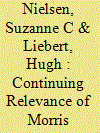

|
|
|
|
|
| Summary/Abstract |
In the current strategic environment, Morris Janowitz’s The Professional Soldier deserves renewed emphasis, especially from the military’s senior leaders who are responsible for the education and development of the country’s officer corps. Janowitz’s work is an especially valuable guide to the education of officers today because of his focus on the need for military officers to understand the political impact of military posture and military operations. The education of U.S. military officers to meet the country’s national security needs in the 21st century must go beyond Huntington’s formulation of expertise to an appreciation, in Janowitz’s terms, of “the political and social impact of the military establishment on international security affairs” across the spectrum of conflict. Janowitz’s formulation is the better guide because military means serve political purposes, and ultimately, a country’s strategic success will be judged in political terms.
|
|
|
|
|
|
|
|
|
|
|
|
|
|
|
|
| 12 |
ID:
169101
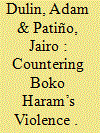

|
|
|
|
|
| Summary/Abstract |
This article examines efforts to counter Boko Haram’s campaign of terrorism in Northern Nigeria from a deterrence–backlash perspective. Drawing from previous research, the authors develop hypothetical expectations for deterrence and backlash effects when counterterrorism policies are conducted at governmental and community levels. Using parametric survival analysis, the authors conclude that government policies designed to curb Boko Haram attacks resulted in backlash. Conversely, community-based efforts resulted in deterrence.
|
|
|
|
|
|
|
|
|
|
|
|
|
|
|
|
| 13 |
ID:
053844
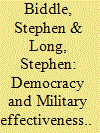

|
|
|
| 14 |
ID:
160626
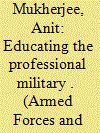

|
|
|
|
|
| Summary/Abstract |
This article analyzes the ways in which civil–military relations shape professional military education (PME). Its main argument is that military education benefits from a civil–military partnership. In doing so, the article examines the role of civil–military relations in shaping PME in India. While describing the evolution of military education in India, it analyzes its weaknesses and argues that this is primarily due to its model of civil–military relations, with a limited role for civilians. Theoretically, this argument challenges Samuel Huntington’s notion of “objective control”—which envisaged a strict separation between the civil and military domains. Conceptually, this article argues for a greater dialogue on military education among civilians, both policy makers and academics, and military officers and not to leave it to the military’s domain—as is currently the practice in most countries.
|
|
|
|
|
|
|
|
|
|
|
|
|
|
|
|
| 15 |
ID:
121816
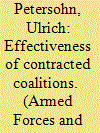

|
|
|
|
|
| Publication |
2013.
|
| Summary/Abstract |
The debate on the effectiveness of Private Security Contractors (PSCs) in Iraq has been waged ever since their first appearance. Statists have argued that they are much less effective than regular troops, while neoliberals consider them an effective supplement to regular troops. However, so far, both schools alike have drawn on anecdotal evidence only; yet, such evidence is prone to a high margin of error and does not allow a comparison of different actors. This article addresses these shortfalls by providing hard data, drawn from the Wikileaks "Iraq War logs" data set, on the conduct of PSCs in Iraq and comparing their performance to that of regular troops, that is, the US and Iraqi armed forces. In general, if PSCs are co-deployed alongside regular troops and oversight is institutionalized, their performance supersedes that of poorly trained military personnel, such as the Iraqi military, and in many cases even that of the highly capable US military.
|
|
|
|
|
|
|
|
|
|
|
|
|
|
|
|
| 16 |
ID:
155766
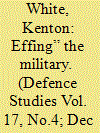

|
|
|
|
|
| Summary/Abstract |
The use of commercial business management techniques is widespread in all government departments, including the Ministry of Defence. This article examines the use of popular management techniques in the Armed Forces and argues that their application is misplaced. It looks at what the “effs” – “efficiency” and “effectiveness” – mean in the business world and to the Armed Forces. It compares the definitions both in business and the Armed Forces and finds that there are few, if any, situations where the same measurements can be applied. Whilst many management techniques are suited for business, the function of the Armed Forces and its output cannot be measured in the same way, complicated by the different metrics of “efficiency” in peace and in war. This difference may not be clearly understood by some politicians, or indeed by some senior military personnel. Using examples from some of the most popular management techniques such as “Lean” and “Agile” it is possible to see that their use might actually diminish the capabilities of the Armed Forces when it comes to performing their principal role – the use of force to achieve political objectives.
|
|
|
|
|
|
|
|
|
|
|
|
|
|
|
|
| 17 |
ID:
173123


|
|
|
|
|
| Summary/Abstract |
This article examines the coherence of the North Atlantic Treaty Organization’s (NATO) coordinated military strategy during the war in Afghanistan. We argue that much of this coherence can be lost when decision makers adopt multinational strategic guidance that is then interpreted by different national contingents operationally. Different strategic and military cultures across troop-contributing countries may account for observed variation in operational outcomes, but better theoretical tools are needed to examine this phenomenon. Our aim is to further scholars’ understanding of how cultural variables can affect mission outcomes. This assumed effect of strategic and military cultures is explored empirically with reference to the Canadian and German Provincial Reconstruction Teams in Afghanistan, which formed part of the NATO-led ISAF operation.
|
|
|
|
|
|
|
|
|
|
|
|
|
|
|
|
| 18 |
ID:
151423
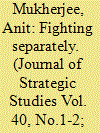

|
|
|
|
|
| Summary/Abstract |
How do countries transition from single service to joint operations? This article engages with the discussion on military innovation to argue that civil–military relations are the most important driver for jointness. In doing so it examines jointness in the Indian military. Relying on archival research and primary interviews this article sheds new light on the operations of the Indian Peacekeeping Forces (IPKF) in Sri Lanka from 1987–1990, the 1999 Kargil War and the Post-Kargil defence reforms. The main argument is that the Indian military’s transition to jointness has been ‘incomplete’ primarily because of its prevailing model of civil-military relations. This model prevents civilians from interfering in the operational issues of the military, including on matters pertaining to jointness. It therefore recommends more forceful civilian intervention to overcome the prevailing single service approach.
|
|
|
|
|
|
|
|
|
|
|
|
|
|
|
|
| 19 |
ID:
188248
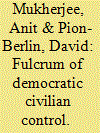

|
|
|
|
|
| Summary/Abstract |
In this introduction we present the justification and the analytical frame of our special issue. More specifically, this issue examines the institutional role of defence ministries in fortifying civilian control and military effectiveness. As we argue, scholarship on this subject is sparse, despite the ministry’s importance in enforcing civilian control, enhancing military effectiveness, and conducting the day-to-day affairs of national defense. If defence ministries are to fulfill these obligations, they must be properly positioned, financially and bureaucratically endowed, as well as staffed with knowledgeable civilians with sufficient authority. Not all ministries are up to these standards. To highlight these aspects, our special issue examines the defense ministries of four countries, two of which are older democracies (France and India) and two more recently established ones (Argentina and South Korea). These case studies pay particular attention to organizational design of the ministries, the roles assigned to civilian and military personnel, how much defense expertise civilians and officers can claim, and whether there are mechanisms that allow ministry personnel to convert resources into military strength. We underscore our contribution to the literature and suggest avenues for further research.
|
|
|
|
|
|
|
|
|
|
|
|
|
|
|
|
| 20 |
ID:
074101
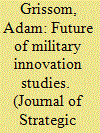

|
|
|
|
|
| Publication |
2006.
|
| Summary/Abstract |
This article assesses the state of the art in military innovation research. It begins with a description of the field's four major schools of thought, summarizing their central tenets, key points of similarity and differentiation, and major empirical cases. It then addresses priorities for future research, observing that while much has been learned about innovation originating among senior officers and civilian policy-makers, far less is known about innovation originating in field formations. Recent empirical studies hint at the importance of such bottom-up innovation but little progress has been made in achieving a conceptual understanding of the phenomenon. Therein lies the next major challenge, and opportunity, for the field.
|
|
|
|
|
|
|
|
|
|
|
|
|
|
|
|
|
|
|
|
|